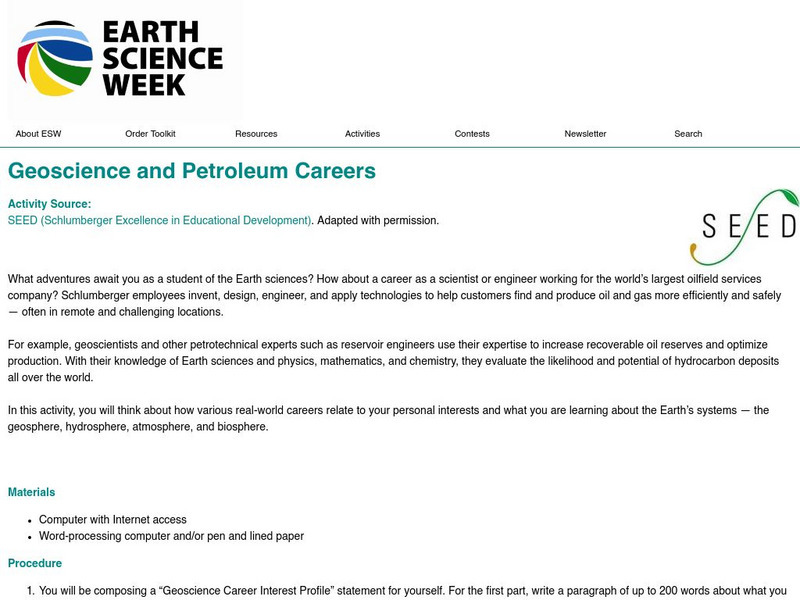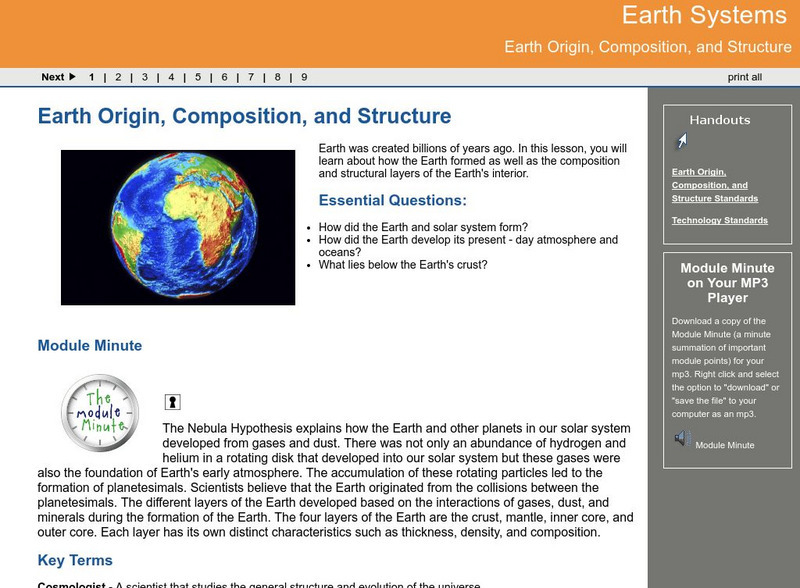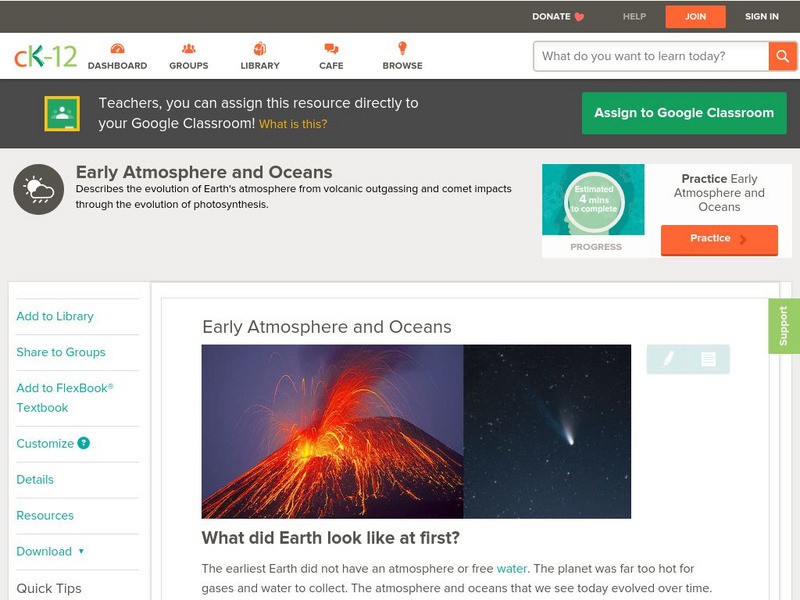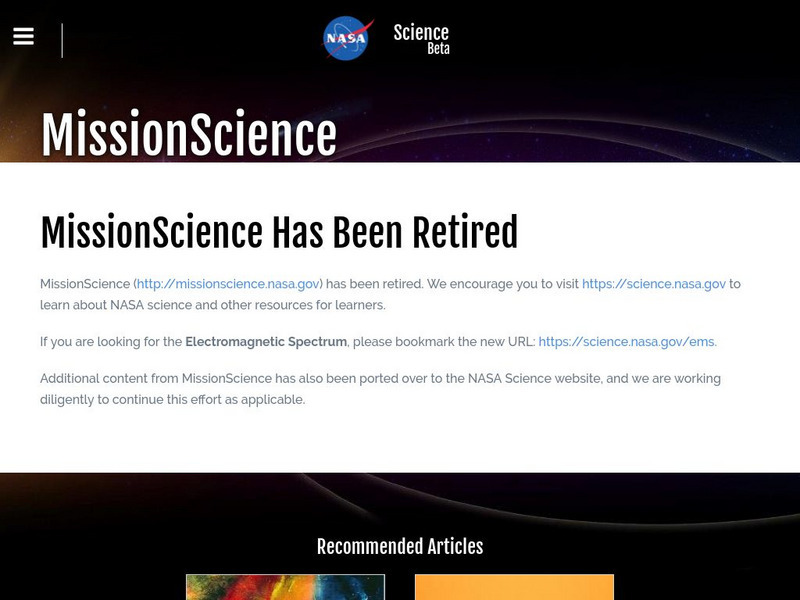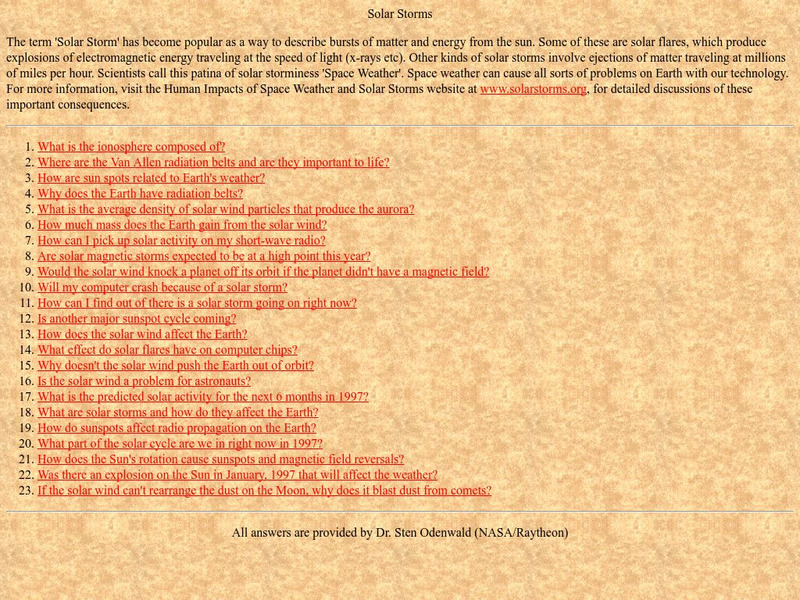Massachusetts Institute of Technology
Mit: Open Course Ware: Courses: Civil Environmental: Ecology I: The Earth System
College-level online course highlighting the fundamentals of ecology. Course topics include coevolution of the biosphere, geosphere, atmosphere, and hydrosphere; photosynthesis and respiration; and the carbon, nitrogen, and water cycles....
Other
Digital Library for Earth System Education (Dlese)
This resource provides materials for teachers on a huge array of topics. Search site by topic, grade level, and desired output (such as lesson plan, case study, assessment or tutorial). Site is focused on earth science, geography, and...
National Association of Geoscience Teachers
Nagt: Earth System Science Project
An Earth System Project shows the interaction between the Geosphere, Hydrosphere, Atmosphere, and Biosphere. This project provides a model of a pond ecosystem and can easily be woven into the hydrosphere unit.
Science Education Resource Center at Carleton College
Serc: Earth System Science
Students learn to identify the parts of the Earth system and the processes that connect them. They look for interconnections among components of the Earth system at the local level, using a study site close to their school.
Other
Digital Library for Earth System Education: Teaching Box: Essentials of Weather
A suite of lessons focusing on the basic elements of climate and weather. Inquiry-based exploration of extreme weather events and the factors of weather including clouds, wind, air pressure, temperature, and the water cycle.
Massachusetts Institute of Technology
Mit: Open Course Ware: Earth, Atmospheric and Planetary Sciences: Solar System
A university-level course that looks at the structure of the solar system, the sun, the planets, and other bodies in space. Includes course readings, assignments, and study notes.
CK-12 Foundation
Ck 12: Flex Book Textbooks: Earth Science Concepts for Middle School
[Free Registration/Login may be required to access all resource tools.] A complete, web-based, multi-media textbook covering a wide variety of Earth science concepts for middle grades.
NASA
Nasa: Earth: Overview: Our Home Planet
Provides a comprehensive look at the planet Earth including photos, how Earth got its name, and facts and figures about its size, seasons, moon, atmosphere, rotation, and lithosphere.
American Geosciences Institute
American Geosciences Institute: Earth Science Week: Geoscience and Petroleum Careers
In this activity, students think about how various real-world careers relate to personal interests and Earth's systems- the geosphere, hydrosphere, atmosphere, and biosphere.
Georgia Department of Education
Ga Virtual Learning: Earth Origin, Composition, and Structure
In this lesson, you will learn about how the Earth formed as well as the composition and structural layers of the Earth's interior.
CK-12 Foundation
Ck 12: Earth Science: Early Atmosphere and Oceans
[Free Registration/Login may be required to access all resource tools.] How Earth's atmosphere and oceans formed.
CK-12 Foundation
Ck 12: Earth Science: Early Atmosphere and Oceans
[Free Registration/Login may be required to access all resource tools.] How Earth's atmosphere and oceans formed.
Science Education Resource Center at Carleton College
Serc: Lab 1: Think Globally: Act Locally
A lab experiment in a series of experiments that explores Earth Science Systems. This lab introduces students to the parts of the Earth system: the atmosphere, hydrosphere, biosphere, and pedosphere. As the students learn about the...
NASA
Nasa: Mysteries of the Sun
Learn about the study of the Sun's influence on the solar system called Heliophysics. This site contains videos on topics like Space Weather, Solar Variability, the Heliosphere, Earth's Magnetosphere, and the Earth's Upper Atmosphere.
Idaho State University
Global Wind Systems [Pdf]
A great description of the global scale circulation and heat energy. Discusses a single-cell model, a three-cell model, jet streams and more.
Science Education Resource Center at Carleton College
Serc: Visualizing Carbon Pathways
This lesson plan introduces students to visualization capabilities available through NASA's Earth Observatory, global map collection, NASA NEO and ImageJ. Students build several animations of satellite data that illustrate carbon...
University Corporation for Atmospheric Research
Ucar: Climate Discovery Teacher's Guide: Investigating Climate Present
Lesson plans on the following: Carbon cycle: Carbon Dioxide Sources and Sinks, Nitrogen Cycle: Traveling Nitrogen, Ocean and Atmosphere: Make Convection Currents, Energy Cycle: Albedo
NASA
Nasa: Image Science Center: Ask the Space Scientist Earth
Site from NASA contains a collection of 91 questions pertaining to the Earth's atmosphere, magnetic field, ionosphere, rotation and origin of life.
Massachusetts Institute of Technology
Mit: Open Course Ware: Courses: Extrasolar Planets: Physics and Detection
A university-level course that examines the atmospheres and interiors of extrasolar planets, or exoplanets. The course also looks at the search for planets that could support life. Includes lecture notes and assignments.
Oklahoma Mesonet
University of Oklahoma: Overview of Meteorology
The University of Oklahoma explores numerous types of weather and atmospheric changes, as well as the reasons behind them. Content details the four seasons, common meteorological variables, the vertical structure of the atmosphere, how...
Climate Literacy
Clean: Climate Feedback Loops
This is the seventh of nine lessons from a student learning module called "Visualizing and Understanding the Science of Climate Change." This lesson addresses climate feedback loops and how these loops help drive and regulate Earth's...
Scholastic
Scholastic: Diagramando a La Ciencia
Fun interactive Spanish site where students will be able to review science vocabulary related with the earth, atmosphere, respiratory system, flower parts and fish anatomy. It provides the English version and different levels of difficulty.
Massachusetts Institute of Technology
Mit: Open Course Ware: Courses: Modern Navigation
College-level planetary science course highlighting modern navigation. Course introduces the concepts and applications of navigation techniques using celestial bodies and satellite positioning systems (GPS). Course features include...
OpenStax
Open Stax: Requirements for Human Life
Earth and its atmosphere have provided us with air to breathe, water to drink, and food to eat, but these are not the only requirements for survival. Although you may rarely think about it, you also cannot live outside of a certain range...







